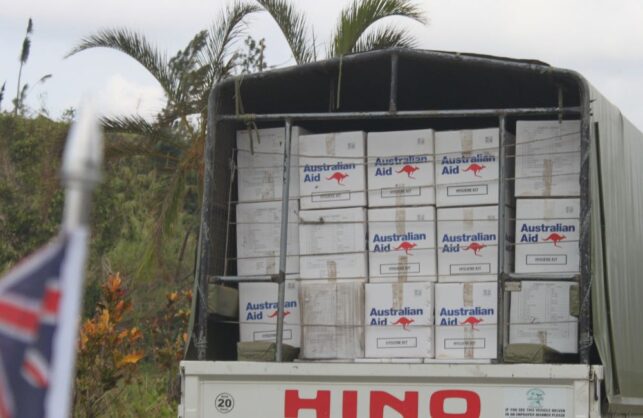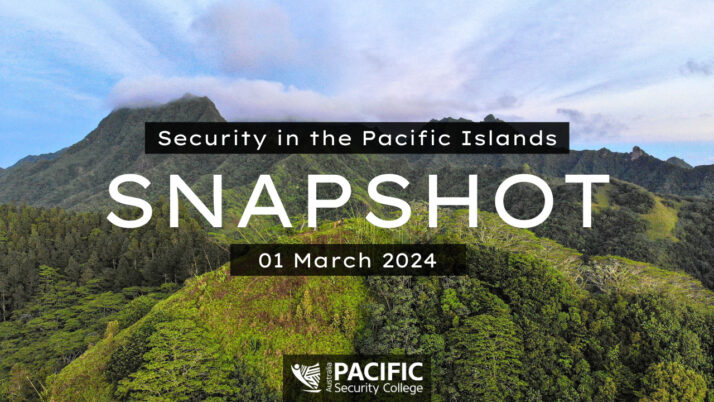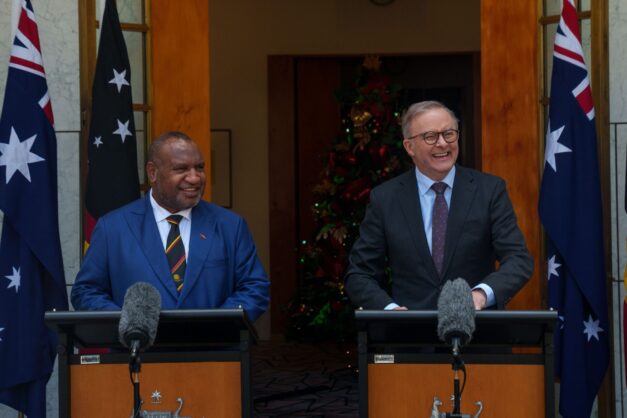Australia and security in the Pacific Islands

PHOTO: Department of Foreign Affairs and Trade on Flickr
James Batley
Do policy differences matter to Australia’s security ambitions?
Australia is still playing a leading role in regional security, despite differences with Pacific Island nations on climate change mitigation and the presence of China in the region, James Batley writes.
Australia’s 2017 Foreign Policy White Paper set out a vision of “helping to integrate Pacific island countries into the Australian and New Zealand economies and our security institutions”. The 2020 Defence Strategic Update outlined Australia’s ambition to “shape our environment” and “deter actions against our interests” from an array of threats and potential threats. While these don’t represent the totality of Australia’s policy approach, they are important themes in its Pacific Step-up.
Against this background, it is a commonplace observation that Australia’s relations in the Pacific have come under stress in recent years. The Pacific Islands Forum’s 2018 Boe Declaration, which describes climate change as “the greatest threat to the livelihoods, security and wellbeing of the peoples of the Pacific”, is often held out as emblematic of the gap between Australia and the Pacific.
The other key area of difference is over geostrategic competition and the role of China. Many Pacific countries don’t share Australia’s strategic anxieties, or at least aren’t prepared to say so publicly. Samoa’s Prime Minister Tuilaepa famously said in 2019, “their [Australia and its allies] enemies are not our enemies.”
To what extent do such differences in policy diminish Australia’s ability to pursue its security interests in the Pacific Island region, not least at a time of heightened ambition on Australia’s part?
An initial answer might be to note that there would seem to be very little evidence that differences over climate change stand in the way of productive bilateral relationships in the region. Tensions between Australia and its neighbours are hardly a new thing and cannot be definitively interpreted as indicators of declining influence.
Nor do all Pacific Island countries adopt a tone of moral equivalence on China’s role in the region. It is less than a year, for instance, since then Palau President Remengesau criticised “Chinese expansionism” and called on the United States to establish a regular military presence in his country.
The Boe Declaration carefully avoids taking a position on the overall geostrategic situation. But to acknowledge that Australia has different security priorities compared to those of Pacific Island countries – whether individually or collectively – is not to deny the legitimacy of either set of priorities. It is a misreading to see the Declaration as necessarily antithetical to Australian interests.
Australia routinely references Boe in its official documentation and programs. And even if major differences exist on climate change the Declaration is about much more than one issue. Its “expanded concept of security” includes humanitarian assistance, transnational crime, health, resource and cybersecurity: all areas where Australia is deeply engaged as the Pacific’s leading partner.
COVID-19 has reminded Pacific Island countries of Australia’s key role in health security. Moreover, Australia is easily the region’s major partner in another critical area of human security – gender – even though the Boe Declaration is notoriously silent on this issue.
Australia’s assets in the region should not be understated. This is as much a matter of relationships as of finances. Those assets include the most intense personal investment by an Australian prime minister in his regional counterparts in memory. They include by far the most extensive diplomatic network across the region, including Department of Defence and Australian Federal Police representation, and cooperation programs.
They include Australia’s membership in the great majority of regional organisations. To be sure, this doesn’t tell us anything about the quality of Australian engagement, nor about the quality of coordination among Australian agencies. But it does underline the unmatched extent of Australia’s engagement and reach in the region.
Australia also counts as an asset the roles played by allies and friends including New Zealand, the United States, France, Japan, and the United Kingdom. Each country is working to increase its presence and activity in the region in ways that are (mostly) consistent with Australia’s interests.
Australia’s Step-up has seen a range of initiatives addressing the imperative of ‘integrating’ and ‘shaping’ the region. They include the Pacific Fusion Centre, the Pacific Security College, and the Joint Heads of Pacific Security meeting – all of which have launched in the past 18 months.
Even though COVID-19 has slowed the implementation of such initiatives, they underline Australia’s convening power in the region, and its ability to underwrite initiatives with finance and personnel. None is focused explicitly on the geopolitical questions confronting the region – if there is a sub-text to them, it is about fostering a regional community of policymakers, in which Australia is deeply and naturally embedded.
It can’t be said that the region yet conceives of itself as a fully-fledged security community. Building such a community is a long-term endeavour and will require strategic persistence and patience.
Still, recent history provides evidence that Australia is successfully prosecuting its ‘traditional’ security interests in the region, as seen in on a number of occasions, including forestalling a proposal for a Chinese-owned undersea cable from Solomon Islands to Australia in 2017, as well as heading off what may have been a Chinese attempt to establish a base in Vanuatu in 2018. Other notable examples include securing Fiji’s approval to redevelop Blackrock Camp into a regional police and peacekeeping training hub, and securing Papua New Guinea’s agreement for Australia to lead the redevelopment of Lombrum Naval Base in Manus.
It is of course artificial to think about Australia’s ‘hard security’ agenda in the region in isolation from other policy initiatives under the Pacific Step-up. The broader aid program and the increasing number of Pacific Islanders working in Australia both serve Australia’s longer-term interests as well as promoting development in the region.
In the contemporary cliché, the Pacific region is more crowded and contested. To be sure, significant gaps exist between Australian and Pacific Islands’ understandings of and approaches to questions of security. But those gaps should be kept in perspective when considering Australia’s place in the region.
This is an extract from the full paper ‘Australia and Security in the Pacific Islands’, which was initially published in Development Bulletin.
Disclaimer: Policy Forum receives support from the Pacific Security College, which is funded as part of the Australian Government’s Pacific Step-up. The views are the author’s own.
More Stories

Security Snapshot - 1 Mar 2024
Pacific Security Snapshot | 01 March 2024
The security stories shaping the region ➣ Pacific Islands Leaders Meeting (PALM) to be held in Tokyo in July 2024 ➣ 2023 warmest year on record, globally ➣ Elections across the Pacific prompting changes to diplomatic relations and security arrangements ➣ Extractive industries booming ➣ Environmental conservation efforts ongoing ➣ PNG riots shed light on…

Blog - 11 Dec 2023
A PNG-Australia security framework: not a treaty but solid nonetheless
Papua New Guinea PM James Marape and Australian PM Anthony Albanese face the media after signing a historical Bilateral Security Agreement on 7 December in Canberra. Credit: PM Albanese Facebook On 7 December 2023, the prime ministers of Australia and Papua New Guinea signed an historic security agreement in Canberra. It has taken approximately…






